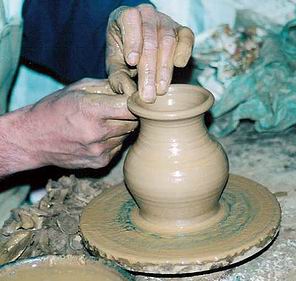Revised Common Lectionary Reflection, First Sunday of Advent, Year B
November 29, 2020

Lessons: Isaiah 64:1-9; Psalm 80:1-7, 17-19; 1 Corinthians 1:3-9; Mark 13:24-37
Theme: God’s faithful and generous people wait in anticipation for the coming of the LORD, letting God shape and mold them for faithful discipleship and stewardship.
Key Scripture: Yet, O LORD, you are our Father; we are the clay, and you are our potter; we are all the work of your hand. – Isaiah 64:8
Can’t we just have a normal Advent? After all, COVID-19 interrupted a lot of family plans for Thanksgiving, and it looks like Christmas shopping, travel and gathering may be complicated, as well. So, no, it looks like Advent will be anything but normal. Maybe the Year B readings are just about right for these crazy times, calling us to a different way of preparing for the arrival of the Messiah. The lessons this week don’t fall into the warm and fuzzy category, rather they are designed to shake us out of our complacency, seasonal nostalgia, and consumption. Each week during Advent we’ll look at some points of entry for all four lessons.
I suspect that many of you have returned to digital worship as COVID cases have risen in your area. Many of you have shared via social media some wonderfully creative ways to keep your congregants engaged from home, everything from Advent bags, to digital devotionals, digital longest night services, and YouTube sing-alongs. Thank you for your faithful and creative witness and ministry. I know it puts extra pressure on you and your ministry partners, so thank you and bless you.
Isaiah 64:1-9: Israel has had it rough. There’s been a whole lot of disobedience going on, and the movement of the lesson is from distance to a plea for renewed relationship and intimacy with the LORD. The people long to see evidence of God’s might and miracles: “O that you would tear open the heavens and come down, so that the mountains would quake at your presence” (Isaiah 64:1). They realize their own complicity in this distance, as sin has brought separation: “But you were angry, and we sinned; because you hid yourself we transgressed” (Isaiah 64:5b). Even recognizing their own complicity, they seem to do the very human thing and blame God for pulling away first, before their sin and transgressions.

Finally, there is a note of hope in this “Debbie downer” of a lesson: “Yet, O LORD, you are our Father; we are the clay, and you are our potter; we are all the work of your hand” (Isaiah 64:8). The people recognize that they need God to mold and shape them into the divine image and into God’s own faithful people. Perhaps this is a good theme for Advent One, from formless lumps to faithful disciples. Only God can mold and shape us, and we must be willing participants in this shaping. After all, as the prophet says, “Now consider, we are all your people” (Isaiah 64:9b). God’s creative, redemptive, and salvific work continues to this day as the Divine One is active in our world. We may not see or sense or even feel the divine presence, but we are assured that God is with us and will not forsake us. Our work in Advent is to allow us to be shaped into disciples who in turn are about the business of paying attention and participating in the in-breaking of Christ’s reign.
Psalm 80:1-7, 17-19: This psalm excerpt echoes well the passage from Isaiah. In verse 19, the psalmist pleas, “Restore us, O LORD God of hosts; let your face shine, that we may be saved.” There have been many tears, derision, and separation, so the people are ready to be restored. In 2020, we, too, have experienced many tears, much anxiety, and certainly an abundance of derision and division. Many of you and your parishioners have been fed with the “bread of tears” and have been given “tears to drink in full measure.” Opening this Advent in lament with hope may be just what is needed for this strange season. We certainly need to be honest about the situation and honor the pain, grief, and anxiety that folks are feeling.
1 Corinthians 1:3-9: If you’re hearing echoes of Harvey Milk and his 1977 Hope speech, “And you have to give them hope,” then this is your lesson. Paul has planted a church in Corinth and is reminding them that he gives thanks for them and that they have been equipped in Christ and do not lack any spiritual gift. Christ will strengthen them, and God is faithful, Paul writes. We, too, are being equipped and strengthened even as the world seems to unravel around us. We have this amazing hope, a hope that will show up as God in the flesh, a tiny, helpless baby, power hidden in weakness. If your folks need hope, then by all means give it to them because we do have hope, even in the shadow of so much uncertainty.

Mark 13:24-37: Mark’s account of Jesus’ apocalyptic teaching is unsettling but also hopeful. There is so much we do not know and cannot know. All we can do in grateful response is to keep on keeping on, being faithful disciples in strange, unsettling times, trusting Jesus that his “words will not pass away.” We are to be alert, awake, paying attention and looking for signs of the Christ in the world. Even though we may not be able to gather in our normal ways this Advent, we can be on alert for Jesus, keeping our focus on that which really matters.
In Worship
If you are a potter, or if you have access to a potter in your congregation, consider throwing a pot or mug while you preach the Isaiah lesson. If you don’t have access to a potter, check out the YouTube video below. Talk about how we are formed from lumps, shaped as dearly beloved disciples.
This Advent is a good time to actually use Advent hymns. Consider “Unexpected and Mysterious” by Jeannette Lindholm and Calvin Hampton, or for something more contemporary check out The Brilliance’s Advent albums. One of my favorites is “Open Up” on their Advent vol. 1 album.
Even if you are worshiping digitally, invite worshipers to light their home Advent wreaths with you.
With Youth
Most of us don’t like to think of ourselves as an unformed lump of clay, but teenagers are still being formed. Our brains are not fully mature until we are about 25 years old. Same goes for our bones: They aren’t fully formed until somewhere between 25 and 30, and then we begin to lose bone mass in our forties. It’s unrealistic, therefore, to expect that a couple of years of confirmation classes will fully form one’s faith.
Explore with youth how they feel about being people in process. Have they ever felt God forming them in subtle ways to be better disciples? How have they grown as students? Athletes? Formation is a lifelong happening. We are never fully formed, but God continues to mold and shape us. How might they like to be shaped? What is most important to them?
With
Children
This week’s focus verse is Isaiah 64:9b: – Now
consider, we are all your people.
In this lesson, the people are asking God to return to them, to shape and save them. They know they have made mistakes, but they ask God to return to them anyway. They make a very important point: “we are all your people.” All of us belong to God whether we realize it or ignore it.
Here, in our church family, all people are welcome because all people belong to God. It’s our job to make room at the table for others, to welcome them, and to help them use their gifts and talents. It’s why we love you all and want to help you grow into the best children of God you can possibly be. In fact, we made promises when you were baptized to walk with you and support you and your family. We do this because we are stronger together. Even when we have to be apart because of the pandemic, we are still stronger as the church because God will not desert us and will continue to work with us in the midst of difficulty and difference.
Finish with a simple echo prayer and blessing.
Dear God (Dear God),
Thank you (Thank you) for loving us (for loving us) and molding and shaping us (and molding and shaping us). Help us to grow into faithful disciples (Help us to grow into faithful disciples) and to make a difference in your name (and to make a difference in your name). Keep us from fear (Keep us from fear). Keep us hopeful (Keep us hopeful). Make us helpful (Make us helpful). Give us peace (Give us peace). Amen (Amen).
Weekly
Stewardship Bulletin Insert
How is God molding and shaping you into a better steward of
God’s abundance? Are you remaining awake and looking for signs of the Christ at
work in your life and in the world? Advent invites us to ponder these questions
and to wait for God.
Stewardship at Home
If you have children at home, consider making some play dough from scratch and make a small Advent wreath that will hold birthday or emergency candles. Talk about the process of creating art and how we work in partnership with the Creator of the Cosmos.
If you do not have small children, consider how you might more fully enter into Advent’s season of waiting and anticipation. No one wants to steal much needed Christmas joy, but it’s even more important this year to experience Advent as the season leading to Christmas. Make an Advent music playlist on Spotify or another streaming service. Consider using a reverse Advent calendar that allows you to help others. Click here or here to learn more.
2017 Reflection: https://www.stewardshipoflife.org/2017/11/wake-wide-awake-and-woke/
2014 Reflection: https://www.stewardshipoflife.org/2014/11/stewards-of-advent-time-awake/
2011 Reflection: https://www.stewardshipoflife.org/2011/11/advent-a-time-for-re-forming/
Note: Reprint rights granted to congregations and other church organizations for local, nonprofit use. Just include this note: “Copyright (c) 2020, Rev. Sharron Blezard. Used by Permission.” Other uses, please inquire: thewritelife@hotmail.com.



Leave a Reply